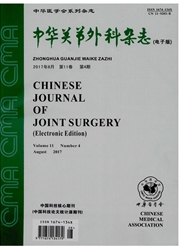

 中文摘要:
中文摘要:
目的探讨术前下肢全长CT相关参数在初次全膝关节置换术(TKA)中的指导作用。方法回顾2014年1月至2015年11月中山大学附属第一医院关节外科行初次全膝关节置换术患者的临床资料。纳入标准:罹患膝骨关节炎行初次TKA的患者;由同一术者操作;临床资料完整。排除标准:既往有类风湿性关节炎、膝关节感染或手术病史;下肢骨骼畸形或膝关节外畸形;合并严重内科疾病影响功能康复患者。符合筛选标准的47例(56膝)行初次TKA患者的临床资料,其中女39例45膝,男8例11膝,平均年龄为67.9(51~81)岁。19例(22膝)术前采用CT分析(改良组),28例(34膝)术前未采用CT分析(传统组)。观察手术时间、术中出血量、术后引流量、术后并发症;分析手术后下肢力线,定义冠状位角度处于正常偏差范围内的假体在同组所占的比例为下肢力线重建及假体安放准确率,比较两组术后下肢力线的改善情况;采用美国膝关节协会评分(KSS)评分评价早期功能恢复情况。符合正态分布的组间比较采用独立样本t检验,不符合者则采用独立样本秩和检验;同组术前、后KSS评分采用配对t检验。计数资料采用卡方检验。结果改良组下肢力线重建准确率为90.9%,较传统组67.6%提高,组间差异有统计学意义(x2=3.982,P〈0.05)。改良组股骨假体安放准确率为95.5%,较传统组70.6%提高(2=5.139,P〈0.05)。改良组胫骨假体安放准确率为95.5%,较传统组94.1%,差异无统计学意义(2=0.047,P〉0.05)。与传统组相比,改良组术中出血量减少(Z=-3.673,P〈0.01),而手术时间(Z=-1.307,P〉0.05)、术后引流量(Z=-0.260,P〉0.05)、并发症(2=0.078,P〉0.05)间的差异无统计学意义。两组病例术后3个月KSS评分较术前均有明显提高,但两组间比较差异无统计学意义(P〉0.05)。结论下肢全长CT术前分析相关参数应用于初次TKA,
 英文摘要:
英文摘要:
Objective To evaluate the clinical significance of the lower extremity CT parameters in total knee arthroplasty (TKA). Methods The clinical data of the patients undergone primary TKA in the department of joint surgery of the First Affiliated Hospital of Sun Yatsen University, were reviewed between January, 2014 and November, 2015. Inclusion criteria: the knee osteoarthritis patients undergone primary TKA and operated by the same surgeon; the clinical data were integrated as well. Exclusion criteria: the patients with rheumatoid arthritis history, knee infection or surgical histories; lower extremity skeletal deformity or other deformity except the knee joint; combining with severe medical diseases that affected the functional rehabilitation. Forty-seven patients (56 knees ) were included in this study [including 39 females(45 knees) and eight males (11 knees)], of which 19 cases (22 knees) were analyzed by preoperative CT parameters to guide the TKA (the modified group ) and 28 cases (34 knees) adopted traditional procedures only (the traditional group). The average age was 67. 9 years (range 51-81 years) . The following indices were collected: operation time, intraoperative blood loss, postoperative drainage and postoperative complications. The preoperative and postoperative mechanical alignments of lower extremity were analyzed to compare the alignment improvement between the two groups; the Knee Society knee score (KSS) was applied to evaluate the early recovery of the patients. Independent sample t test was performed to analyze the data complied with the normal distribution and Mann-Whitney U test was adopted to analyze the data with abnormal distribution. The differences of preand postoperative KSS scores of one group were compared by paired t test. The enumeration data were compared by the Chi-square test. Results The accuracy of lower extremity alignment reconstruction of modified group were 90. 9% and that of the traditional group were 67.6%, showing significa
 同期刊论文项目
同期刊论文项目
 同项目期刊论文
同项目期刊论文
 期刊信息
期刊信息
